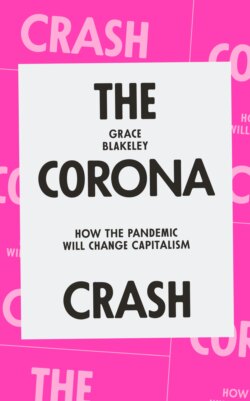The Corona Crash

Реклама. ООО «ЛитРес», ИНН: 7719571260.
Оглавление
Grace Blakeley. The Corona Crash
Отрывок из книги
The Corona Crash
How the Pandemic
.....
We have no answers to any of these questions, and the fact that the governments of the US and the UK seem to be making things up as they go along does not make it any easier to guess. In the context of this dramatic – almost unprecedented – uncertainty, the optimism of the summer months of 2020 is, at some point, likely to give way to a self-reinforcing cycle of pessimism. Although much depends on the policy response, societies around the world are facing mass unemployment, falling incomes and widespread corporate and personal defaults. Far from a V-shaped recession, it will probably take years for the economy to recover to pre-crisis output levels. The UK’s services-dependent economy is expected to be the worst hit within the OECD.7
The severity of the pandemic-induced recession is at least in part a result of the pre-existing vulnerabilities of the global economy. After a decade of slow growth, surging debt levels and rising inequality, we can rarely have been worse prepared for a new recession. The recovery from the 2008 financial crisis was characterised, above all, by stagnation – of wages, productivity and investment. Many wealthy economies saw the share of national income taken by labour fall.8 For the first time in decades, globalisation had gone into ‘retreat’, owing to the difficulties of its financial wing. Crossborder capital flows declined by 65 per cent between 2007 and 2016.9 Global growth was buoyed only by incredibly cheap credit and public investment undertaken by developmental states in the Global South. Central bankers were forced to keep the economy on life support through ultra-low interest rates and quantitative easing. But even with monetary policy so loose, private investment in fixed capital was not forthcoming. Instead, the main effect of low interest rates was to inflate a debt bubble three times the size of global GDP.10
.....